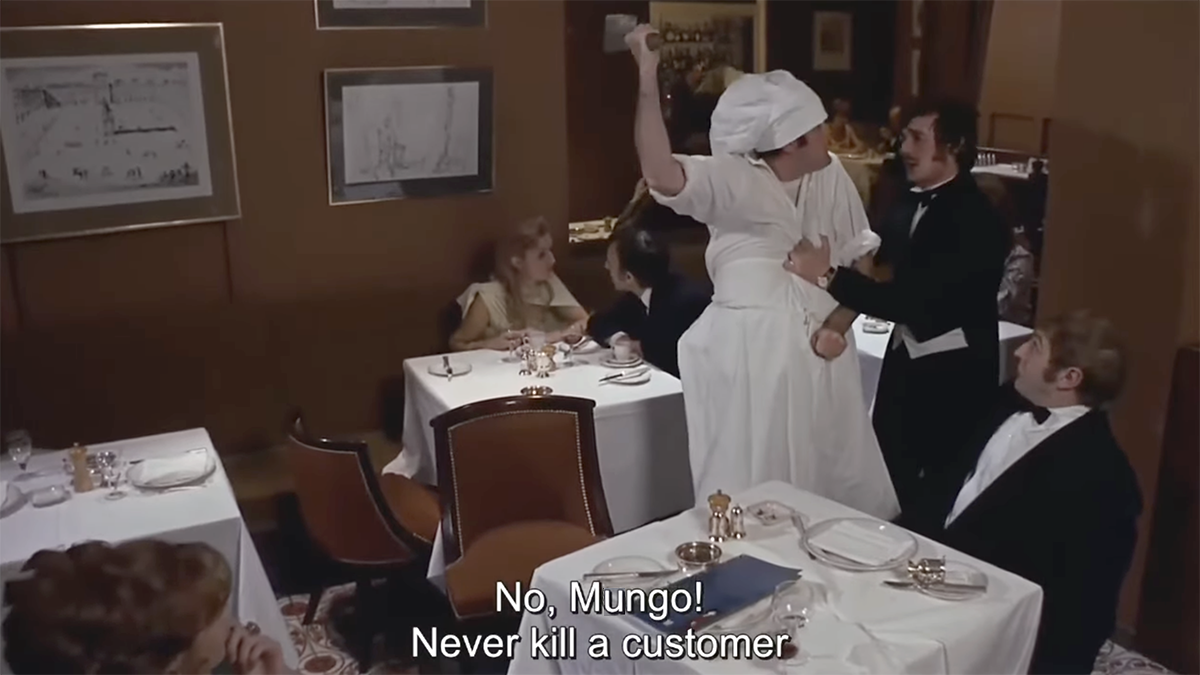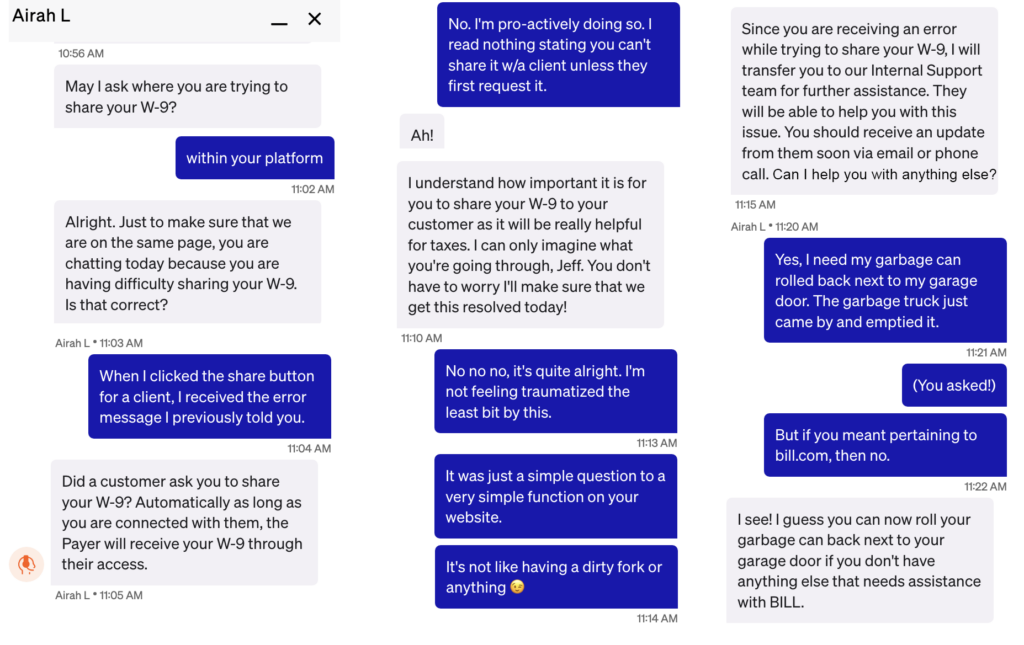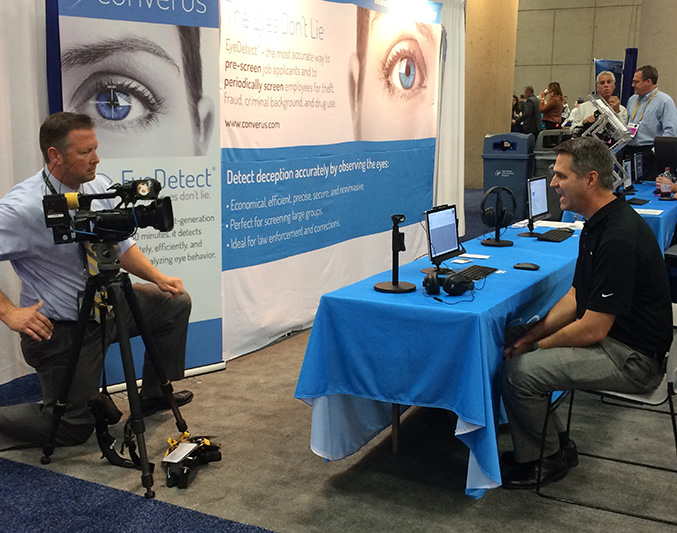
It all started when a man in a restaurant noticed he had a dirty fork.
It was only a tiny speck of dirt on his fork.
However, this gentle request about a slightly dirty fork escalates into melodramatic apologies from the head waiter and then the restaurant manager.
After the head waiter tells the waiter in a very angry, intense voice to sack (fire) the entire dishwashing staff, the customer tells the head waiter he didn’t intend to cause any trouble.
Responds the head waiter, “It’s quite right that you bring this sort of thing to our attention.“
“Please, I don’t want to make any fuss,“ the customer again reassures.
“Oh, no, there’s no fuss. We simply wish to ensure that nothing interferes with your complete enjoyment of the meal,” says the head waiter.
“I’m sure it won’t. It was only a dirty fork,“ the customer responds.
“I know, and I’m sorry. Bitterly sorry. But I know nothing I can say can alter the fact that in this restaurant you have been given a dirty, filthy, smelly piece of cutlery…“
Soon Mungo the chef emerges from the kitchen with a cleaver. He’s very upset this customer has caused such consternation among the restaurant staff. As he raises his cleaver in a threatening manner toward the customer, he’s restrained by the restaurant manager, who says:
“No, Mungo! Never… kill a customer!!”
Yyou may recognize this classic skit from an episode of Monty Python’s Flying Circus. (Episode 3; original air date on the BBC was October 19, 1969.)
My Strange Tech Support Chat with Bill.com
While this comedy sketch is just a bit on the extreme side, it makes an important point. Do we sometimes go over the top when it comes to apologizing to a customer? So much so that it sounds disingenuous?
That happened to me the other day while in a tech support chat with Airah at Bill.com. (See image of a portion of our convo below.) I should point out: she was only doing her job by following the training she’s received.
I noticed they offer the option to share my W-9 with my clients, so I completed their form and then hit the button to share it with a client.
That produced the error message that it wasn’t able to share my W-9. So I thought I’d hop on their chat tech support to quickly resolve the issue.
First Airah strangely asks, “May I ask why you are trying to share your W-9?”
I wasn’t sure what to respond. There was now a share button next to each client, and I thought I’d click the button for a new client I just added.
Airah responds, “Did a customer ask you to share your W-9? Automatically as long as you are connected with them, the Payer will receive your W-9 through their access.”
“No. I’m pro-actively doing so. I read nothing stating you can’t share it w/a client unless they first request it.”
What then ensued reminded me of the “Dirty Fork” sketch’s over-the-top apologies.
“I understand how important it is for you to share your W-9 to your customer as it will be really helpful for taxes. I can only imagine what you’re going through, Jeff. You don’t have to worry I’Il make sure that we get this resolved today!”
Oh yes. My next call was going to be to a psychiatrist for all the mental trauma this caused me…
…but only because I received a response dripping with disingenuous, exaggerated empathy.
At least Mungo didn’t jump on this chat before it was concluded. Whew.

OfficeDepot’s Email Lie
Here’s another example of a business’ communication that totally missed the mark.
In fact, it was an outright lie.

We occasionally send color print jobs to OfficeDepot. When the order is ready for pick up, they send an email. Included in their email message is this: “Use the $10 off your $30 regularly priced purchase coupon that will be attached to your order when you pick it up at the store.”
Let’s double-check this message: It does say “will” and not “might” — right?
Well, when Leticia picked up her flyers promoting her storytelling to senior centers, no coupon was attached. But some of the other orders in Will Call had the coupon attached. She had to ask the OfficeDepot copy center employee for one.
The employee at the copy center explained they sometimes run out of coupon copies and therefore don’t always attach copies to every order.
Wow. The irony in that is just too much.
Are You Killing (Off) Customers?
Effective communication is essential to building trust and retaining customers, but poor communication can have the opposite effect — damaging a business’ professional image and alienating its audience.
Whether it’s overly scripted tech support responses or exaggerated apologies, bad communication can leave customers frustrated, confused, or even insulted. When tech support staff rely on scripted responses, they can sound disingenuous rather than empathetic (like the bill.com example I shared).
While the intent might be to comfort, over-the-top phrasing can come off as patronizing or fake. It distracts from the issue at hand and leaves customers doubting whether the support team understands their concern or has the competence to resolve it.
An apology that’s out of proportion can be as problematic as a dismissive one. When businesses over-apologize, it can make customers feel uncomfortable or question the company’s professionalism.
A well-calibrated apology should acknowledge the issue sincerely and focus on solutions, rather than turning a minor problem into an unnecessary drama.
The Damage of Unclear or Irrelevant Messaging
Another way to kill off customer loyalty and trust is communication that doesn’t directly address the issue. This can frustrate customers and waste their time.
For instance, if a customer asks for clarification on an error message but receives a generic response that skirts the problem, they’re left wondering if the company knows what it’s doing. This can erode trust, as customers might assume the business is being evasive rather than helpful.
Authentic, well-crafted communication builds trust, reinforces professionalism, and shows customers that their concerns are understood and valued. Anything less risks sending them straight to your competitors.
The 3 Big Takeaways
To avoid “killing” customers’ loyalty, businesses need to prioritize genuine, clear, and solution-focused communication. Here are three tips to make that happen:
- Train Support Teams for Empathy and Expertise: Equip staff with the knowledge to address issues directly while maintaining a personable tone.
- Match the Apology to the Situation: Acknowledge errors without overreacting or trivializing the problem.
- NEVER Go Mungo on a Customer: Maintain your cool and professionalism at ALL costs.
What type of head-scratching or frustrating communications have you encountered with businesses? Do share!
Do you need a communications audit to assure everything you’re saying is authentic, sincere and clear? Then schedule a time to chat here.

Jeffery E. Pizzino, APR is a spin-free public relations pro who is passionate about telling the why of your story with clarity, impact and authenticity. He began his PR career in 1987 at Ketchum Public Relations in New York City but has spent the majority of his career as a solopreneur. He’s AuthenticityPR’s Chief Authentic Officer and also functions as the fractional CCO for technology startup Converus.
Jeff has an MBA in Management from Western International University and a Bachelor of Arts degree in Communications — with an emphasis in PR — from Brigham Young University. He’s a native of Milwaukee, Wisconsin, but also holds an Italian citizenship. Jeff and his storyteller wife Leticia have four children and four grandchildren. In his extremely limited nonwork hours, he studies italiano, practices guitar, gardens, disc golfs, reads, listens to New Wave music, serves in his church, watches BYU football, and plays Dominion and Seven Wonders. Email Jeff.

